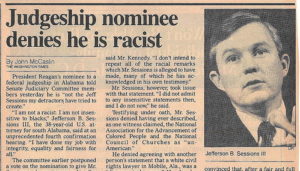Donald Trump has selected Senator Jefferson Beauregard Sessions ( R, Alabama) to be the attorney general of the United States.
In 1986 Sessions’ nomination for a federal judgeship was rejected by the Judiciary Committee of Republican-controlled Senate. Reagan’s nominee, he was one of two judicial nominees whose selections were halted by the panel in nearly 50 years. Former colleagues said that Mr. Sessions had referred to the N.A.A.C.P., the Southern Christian Leadership Conference and other civil rights groups as “un-American” and “Communist-inspired.” Thomas H. Figures, an African-American federal prosecutor in Alabama said that, during a 1981 murder investigation involving the Ku Klux Klan, Mr. Sessions had referred to him as “boy” and described the Ku Klux Klan as fine “until I found out they smoked pot.” Mr. Sessions dismissed that remark as a joke. Mr. Sessions was also accused of speaking disparagingly of the Voting Rights Act and the stringent oversight it placed on Southern states.
 Sessions denied the allegations and told the Senate Judiciary Committee “I am not a racist, I am not insensitive to blacks. I have supported civil rights activity in my state. I have done my job with integrity, equality, and fairness for all.” Sessions also stated he detested the Klan and called the assertions “ludicrous”. In response to a question from Joe Biden on whether he had called the NAACP and other civil rights organizations “un-American”, Sessions replied “I’m often loose with my tongue. I may have said something about the NAACP being un-American or Communist, but I meant no harm by it.”
Sessions denied the allegations and told the Senate Judiciary Committee “I am not a racist, I am not insensitive to blacks. I have supported civil rights activity in my state. I have done my job with integrity, equality, and fairness for all.” Sessions also stated he detested the Klan and called the assertions “ludicrous”. In response to a question from Joe Biden on whether he had called the NAACP and other civil rights organizations “un-American”, Sessions replied “I’m often loose with my tongue. I may have said something about the NAACP being un-American or Communist, but I meant no harm by it.”Sessions was elected Attorney General of Alabama in 1994, and to the U.S. Senate in 1996, being re-elected in 2002, 2008, and 2014. When elected to the Senate in 1996, the Bush II era GOP appointed Sessions to the Judiciary Committee. Sessions became a cheerleader for the Bush administration’s judicial picks, defending such dubious nominees as Charles Pickering, who in 1959 wrote a paper defending Mississippi’s anti-miscegenation law, and Judge Dennis Shedd, who dismissed nearly every fair-employment civil rights case brought before him as a federal district court judge. Sessions called Pickering “a leader for racial harmony” and a “courageous,” “quality individual” who was being used as a “political pawn.” Regarding Shedd, he pooh-poohed the criticism, announcing that the judge “should have been commended for the rulings he has made,” not chastised.